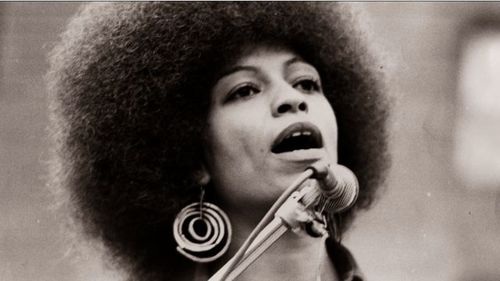
When I was younger, in the eighties, one of the greatest compliments (or insults, depending on who said it) was to be told you had an "Angela Davis" afro. The hairstyle then didn't resonate the same meaning as it did in the late sixties and seventies, when, in those days, it called forth a number of responses from people the world over. To the mainstream establishment in the United States, Angela Davis, crowned with the fullest of afros, was the embodiment of terrorism and the specter of overthrow. To the kids that I grew up with, in a middle-class, black neighborhood on Long Island, New York, she represented an era that we'd heard about, but, perhaps, didn't understand very well. We did know, however, that most of our parents considered her a hero, while most of our teachers didn't. Free Angela, a feature length documentary directed by Shola Lynch, does a fine job in helping to explain how Ms. Davis came to represent so much to so many.
The political and social environment in the late sixties and early seventies was amongst the most turbulent this nation has seen. It is during this time that Ms. Davis rose to prominence, first, as a philosophy professor at UCLA, then as an political activist, battling the state forces allied against her and organizations such as the maligned Black Panther Party, for whom she was a staunch advocate. In an atmosphere of increasing danger, and in which friends and associates of her's lost their lives, it becomes clear in the film when, none other than America's then voice of authority and gravitas, Walter Cronkite reports that Angela Davis had been placed on the F.B.I.'s 10 Most Wanted List, that a confrontation was indeed at hand. After a frenetic flight from pursuit, she is captured as a fugitive and imprisoned, to await trial facing the death penalty on three counts. The ultimate state punishment was levied at her, the most threatening of Black people, at a time when the state felt most threatened. This is within ten years of the murders of Medgar Evers, Malcolm X, John F. and Robert F. Kennedy and Martin Luther King. The fabric of society being rent apart, one can reason the state being justified in using the most extreme means for it's preservation. This film deftly presents a case against such reason. Constitutional and state laws were tested to decide her fate, which was being witnessed by the world, Ms. Davis having become, by then, a cause célèbre for equal rights and justice for the oppressed. Then Governor of California, Ronald Reagan, and President Richard Nixon representing what today would be called "the Right", and Angela Davis, and those she championed, representing "the Left", this battle for the ages, in some ways, continues.
Through reportage and narrative, Ms. Lynch builds the drama in this story as Joseph Campbell would weave a mythological tale; the hero facing myriad trials along her journey until she finds redemption. Supported by a breathtaking amount of archival and historical footage, as well as subtle re-enactments, she has crafted a balanced documentary which presents enough evidence of the actions of both the hero and the opposition, to allow the audience to make it's own judgement as to its veracity and fairness. This is a hard story to tell, a hard balance to maintain, with it's subject also serving, in part, as narrator. Richard Nixon, known for law and order, is driven from office in disgrace. Legends are often equal parts fact and fantasy, and the legend of Angela Davis, as chronicled in this film, might be categorized as history being told by the victor. It might be too soon, yet, to declare victory, as we still live in a society where race is an issue affecting much of the conversation, justice is uneven, and freedom is a nebulous concept. A most timely observation is that, at it's heart, this was a case about our Second Amendment right to bear arms, an issue that clearly has yet to be resolved. There is hope in the telling of this story, however. Making this important information available helps to counter the many years of misrepresentation, and provides it on a grandly consumable scale. It allows for a younger audience to gain more understanding of a violent, troubled period in this country's history and, perhaps, draw parallels to the turbulence we experience today. It may allow them, as it allowed Ms. Davis, in her youth to say, "my world is changing, and I do want to be a part of this".
